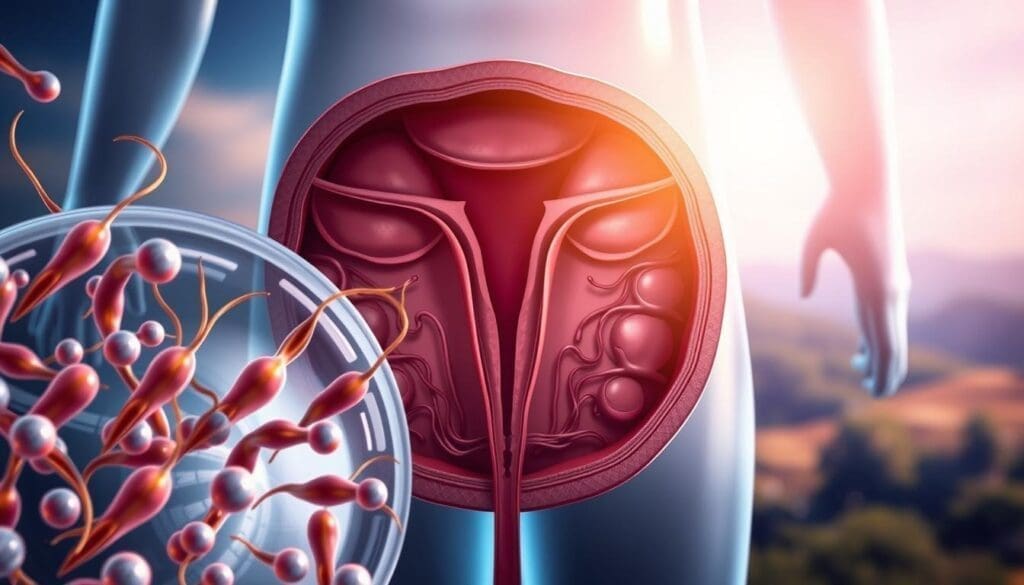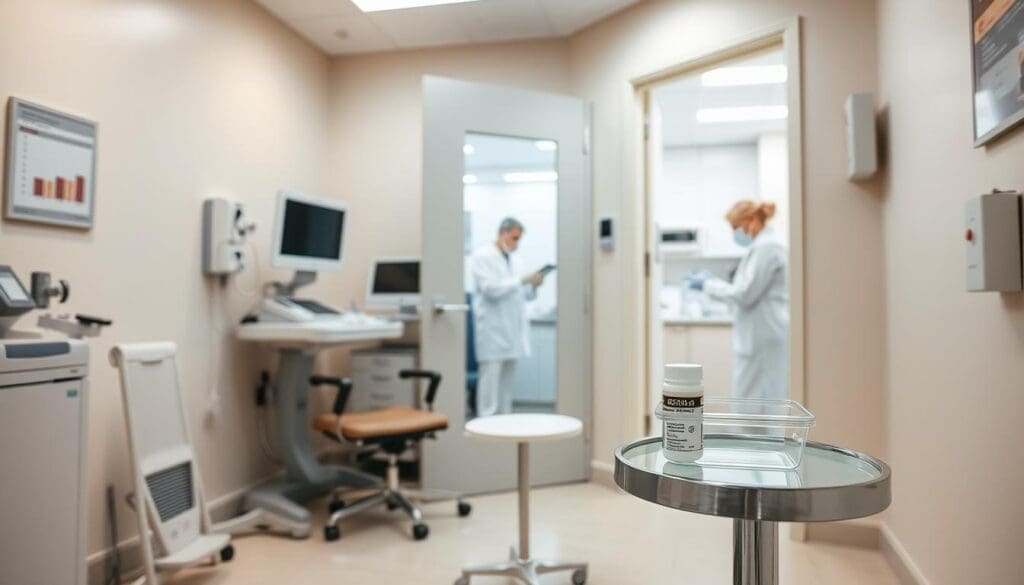Last Updated on November 25, 2025 by Ugurkan Demir

Understanding your sperm health is key to becoming a father. At Liv Hospital, we offer top-notch fertility care. This starts with sperm testing, a simple yet essential test. It checks your sperm count, motility, and shape where to get sperm tested.
You can get sperm tested at many fertility clinics, hospitals, and andrology labs. Our team is here to help you. We give you insights into your fertility and tips to improve your sperm count.
We aim to give you the best healthcare, including for international patients. We help from the first test to tips to boost your sperm count. Our goal is to offer reliable, expert, and patient-focused fertility care.

Sperm health is key to male fertility, helping men conceive. It’s important to know what makes sperm healthy.
Sperm is vital for getting pregnant. For a baby to be conceived, sperm must be in good shape. This includes having enough count, moving well, and being the right shape.
Sperm count is how many sperm are in a sample. Sperm motility is how well they move. Morphology checks their shape and structure, which is needed for fertilization.
When we check male fertility, we look at these three things. Any problems here can make it harder to get pregnant.
Many things can change sperm quality. Lifestyle, what we’re exposed to, and health issues can all play a part. Age is a big one, as sperm quality often goes down as men get older.
Exposure to toxins, some medicines, and health problems can also hurt sperm. Issues like varicocele or infections in the testicles can make sperm production worse.
Knowing how sperm health works and what affects it helps us take action. At Liv Hospital, we offer expert care to help men and couples with their fertility goals.

Sperm testing is key for checking male fertility. Men can choose from many places to get tested. Each option meets different needs and preferences.
Fertility clinics and reproductive centers are top spots for sperm testing. They have the latest tech and experts for detailed semen analyses. These pros can tell you about sperm health, like count, motility, and shape.
Hospitals have andrology departments for sperm testing. These places are set up for semen analysis and give precise results. They also have teams for other health issues.
Andrology labs focus on male reproductive health. They use the latest tech for sperm testing. These labs offer detailed and accurate results, plus special tests not found elsewhere.
At-home testing kits are a private and easy choice. Men can collect a sample at home and send it for analysis. But, it’s important to talk to a doctor to understand the results and what to do next.
In summary, men have many options for sperm testing, from clinics to at-home kits. The best choice depends on personal needs, the level of detail wanted, and any extra support needed.
The semen analysis is a key test for male fertility. It looks at sperm count, motility, and morphology. This detailed check helps understand a man’s reproductive health and spot any fertility issues.
When you get a semen analysis, you’ll need to give a semen sample. It’s then tested in a lab. You’ll collect the sample in a private room at the clinic or lab. It’s important to listen to the healthcare professional’s instructions to get it right.
To get precise results, it’s key to follow the sample collection guidelines given by your healthcare professional. This includes:
To get ready for a semen analysis, know what the test involves and how to get accurate results. It’s also important to follow any specific instructions from your healthcare professional. This might mean avoiding certain medicines or activities before the test.
Being well-prepared and knowing what to expect can help make the semen analysis accurate. This ensures the results give a clear view of your reproductive health.
Understanding your sperm test results is key to knowing your fertility. When you get your results, you’ll see how your sperm health affects your chances of getting pregnant.
Sperm count is a vital part of semen analysis. It shows how many sperm are in each milliliter of semen. A normal count is at least 15 million per milliliter. If it’s lower, it might mean you have a low sperm count, which can make it harder to get pregnant.
Sperm count is just one aspect of semen analysis. Other factors like motility and morphology also matter a lot for fertility.
Sperm motility is about how well sperm move through the female reproductive tract. It’s divided into types, like progressive motility (moving straight) and non-progressive motility (moving but not straight). More progressive motility means better fertility chances.
The World Health Organization (WHO) sets guidelines for normal sperm motility. They say a sample is normal if at least 32% of sperm move well.
Sperm morphology looks at sperm shape and structure. Bad shape can make it hard for sperm to fertilize an egg. The WHO now says a sample is normal if at least 4% of sperm look right.
Knowing about sperm count, motility, and morphology gives a full picture of sperm health. If your results show problems, talk to a healthcare provider. They can help with treatments and lifestyle changes to boost fertility.
Other things are checked in a semen analysis too. These include semen volume, pH, and white blood cells. Each gives clues about reproductive health and fertility.
By really getting your sperm test results, you can take steps to fix fertility issues. Talking to a fertility specialist can give you advice tailored to your needs.
Getting pregnant with a low sperm count is tough, but it’s doable. Many couples manage to conceive naturally or with help, even with low sperm counts. We’ll look into the chances of natural conception, success rates, and other factors that affect getting pregnant.
Natural conception with a low sperm count is less likely but possible. The success depends on many things. These include the health of both partners, how severe the low sperm count is, and when they have sex.
To boost their chances, couples should work on their reproductive health. They should also time their sex right, around when the woman ovulates.
Research shows men with low sperm counts can father a child. The American Society for Reproductive Medicine found that men with mild infertility have a better chance of conceiving naturally. This is compared to those with more severe issues.
| Sperm Count (million/mL) | Natural Conception Rate (%) |
| 10-15 | 20-30 |
| 5-10 | 10-20 |
| <5 | <10 |
Sperm count is key, but not the only factor. Sperm motility, shape, and health, along with the woman’s age and health, are also important. The timing and frequency of sex also matter.
Key factors influencing conception beyond count include:
Making lifestyle changes can greatly improve sperm health. By adopting healthier habits, you can boost your sperm production and fertility.
Regular exercise boosts sperm count and quality. It improves overall health, including reproductive health. It does this by increasing circulation, reducing stress, and boosting hormone levels.
Types of Exercise: Aerobic exercises like running or cycling and resistance training are good. But, too much exercise can be bad.
Smoking and drinking too much alcohol harm sperm health. Quitting smoking and drinking less can improve sperm count and motility.
Benefits of Quitting: Quitting smoking can improve sperm quality in a few months. Drinking in moderation also helps keep sperm healthy.
High stress can lower testosterone levels, which is key for sperm production. Stress management, like meditation or yoga, can help.
Stress Reduction Techniques: Mindfulness, deep breathing, and regular exercise can reduce stress.
Too much heat can harm sperm production. Avoiding hot tubs, saunas, and wearing loose clothes helps keep the scrotal area cool.
| Lifestyle Change | Impact on Sperm Health |
| Regular Exercise | Improves sperm count and quality |
| Quitting Smoking | Enhances sperm quality and count |
| Limiting Alcohol | Supports healthy sperm production |
| Managing Stress | Maintains healthy hormone levels |
| Avoiding Excessive Heat | Protects sperm production |
Managing your weight is key to better sperm quality and reproductive health. Studies show that a healthy weight is essential for good sperm health. We’ll look at how weight affects sperm and how to improve it.
Being obese can lower fertility in men. Research finds obese men often have fewer sperm, less active sperm, and more DNA damage. This is because too much fat can upset hormone levels, including testosterone, which is vital for sperm.
Key factors linking obesity to reduced fertility include:
Healthy weight loss can boost sperm health. Effective methods include:
Steer clear of crash diets and aim for lasting lifestyle changes. Getting advice from a healthcare provider or nutritionist can help craft a tailored weight loss plan.
Keeping a healthy Body Mass Index (BMI) is vital for reproductive health. BMI is your weight in kilograms divided by your height in meters squared. A BMI of 18.5 to 24.9 is considered normal.
Benefits of maintaining an optimal BMI include:
By managing your weight and keeping a healthy BMI, men can greatly enhance their sperm health and fertility.
What you eat greatly affects sperm production and health. Eating a balanced diet full of key nutrients can boost sperm health and fertility.
Some nutrients are key for sperm health. These include:
Eating the right foods can greatly help sperm health. Some good foods are:
It’s also key to know what to avoid. Try to limit or avoid:
Making smart food choices can help improve sperm health and fertility.
Many people look for ways to boost their fertility. They often turn to supplements to help increase sperm count. It’s important to know which supplements might help with sperm health.
Vitamin C is known for fighting off oxidative stress. Antioxidants like vitamin C can improve sperm quality by protecting DNA. Eating foods high in vitamin C, like citrus fruits and leafy greens, is good. But supplements can also fill nutritional gaps.
Zinc is key for male fertility, helping with sperm production and testosterone. A zinc deficiency can lower sperm count and quality. Taking zinc supplements can help, but it’s important to follow the recommended amounts to avoid harm.
Coenzyme Q10 (CoQ10) is an antioxidant that might help sperm health. Studies show CoQ10 could improve sperm count and motility. Supplements like folic acid, selenium, and omega-3 fatty acids might also help, but more research is needed.
Even though these supplements seem promising, it’s vital to talk to a healthcare provider first. A healthcare professional can guide you based on your health and fertility goals. They can also warn about possible side effects or interactions with other medicines.
In summary, some supplements might naturally increase sperm count. But, a healthy diet, lifestyle, and professional advice are essential for the best fertility results.
Figuring out if your sperm is healthy involves looking at a few key things. Some signs can be seen with the naked eye, but for a full check, you need lab tests.
Some signs can tell you about sperm health. For example, semen’s color and feel can show how good your sperm is. Healthy semen is whitish-gray, jelly-like, and changes from solid to liquid in 20-30 minutes. If it doesn’t look right, it might mean there’s a problem.
The amount of semen you ejaculate is also important. A normal amount is between 1.5 and 5 milliliters. If you have too little, it could mean there’s a blockage or health issue.
Even though you can see some signs, they’re not always enough. Many men with normal-looking semen can have fertility problems. Trying to guess on your own is not as good as lab tests.
Lab tests, like semen analysis, are the best way to check sperm health. They look at how many sperm you have, how well they move, and what they look like. A detailed semen analysis can really show how fertile you are.
If you’re trying to have a baby or worry about your fertility, see a doctor for lab tests. They can help you understand your results and what to do next.
Men with low sperm count have options to improve their fertility. Dealing with fertility issues can be tough. It’s key to look at all possible solutions.
Medicine can help with low sperm count. Hormone regulation is vital because hormones affect sperm production. Clomiphene citrate or gonadotropins might be given to boost hormone levels and sperm count.
Talking to a doctor is important to find the right medicine and dose. We’ll help you track how well the treatment works and adjust as needed.
Surgery can fix physical problems causing low sperm count. For example, varicocele repair can help by fixing swollen veins in the testicle.
Other surgeries like vasectomy reversal or sperm retrieval might also be options. We’ll talk about the good and bad of each to help you decide.
Assisted Reproductive Technologies (ART) provide several choices for low sperm count. In Vitro Fertilization (IVF) and Intracytoplasmic Sperm Injection (ICSI) can greatly increase the chance of getting pregnant.
| ART Procedure | Description | Success Rate |
| IVF | Fertilization of egg and sperm outside the body | 40-50% |
| ICSI | Direct injection of sperm into the egg | 50-60% |
We’ll help you pick the best ART method for you, based on your needs and health history.
Understanding and managing your reproductive health is key to your overall well-being. By making informed choices and seeking medical help when needed, men can boost their fertility. This way, they take charge of their reproductive health.
We’ve looked at how to get sperm tested, understand the results, and improve sperm production. Healthy habits like a balanced diet, regular exercise, and managing stress can help. These actions can enhance fertility.
Controlling reproductive health requires education, lifestyle changes, and sometimes medical help. By being proactive, men can increase their chances of conceiving. We urge men to be involved in their reproductive health. Seek professional advice and support to achieve the best fertility.
To boost sperm count, live a healthy lifestyle. Eat well, exercise often, and manage stress. Avoid too much heat. Supplements like vitamin C, zinc, and CoQ10 can help too. But, talk to a doctor before taking any supplements.
Yes, getting pregnant with low sperm count is possible. But, it might be harder. Look into fertility treatments to increase your chances.
Physical signs like normal sperm shape and movement hint at health. But, lab tests are key to check sperm quality. See a doctor for a semen analysis.
To boost sperm count, stay fit, manage stress, and keep cool. Eat foods full of antioxidants and zinc. A healthy diet supports sperm health.
Yes, getting pregnant with low sperm count is possible. But, it’s harder. Try different fertility treatments to boost your chances.
To make more sperm, live healthy. Eat right, exercise, and manage stress. Supplements like vitamin C, zinc, and CoQ10 might help. But, check with a doctor first.
A healthy lifestyle boosts sperm count. Eat well, exercise, and manage stress. Supplements like vitamin C, zinc, and CoQ10 can also help. Keep a healthy weight and avoid too much heat.
To improve low sperm count, live healthy. Eat well, exercise, and manage stress. Supplements like vitamin C, zinc, and CoQ10 can help. Sometimes, fertility treatments are needed.
Yes, getting pregnant with low sperm count is possible. But, it’s harder. Try different fertility treatments to increase your chances.
To boost sperm count, live healthy. Eat well, exercise, and manage stress. Avoid too much heat. Supplements like vitamin C, zinc, and CoQ10 might help. But, talk to a doctor first.
To naturally boost sperm count, live healthy. Eat well, exercise, and manage stress. Supplements like vitamin C, zinc, and CoQ10 can help. Keep a healthy weight and avoid too much heat.
World Health Organization. (2025). Where Can You Get Your Sperm Tested and. Retrieved from https://www.who.int/publications/i/item/9789240030787
Subscribe to our e-newsletter to stay informed about the latest innovations in the world of health and exclusive offers!